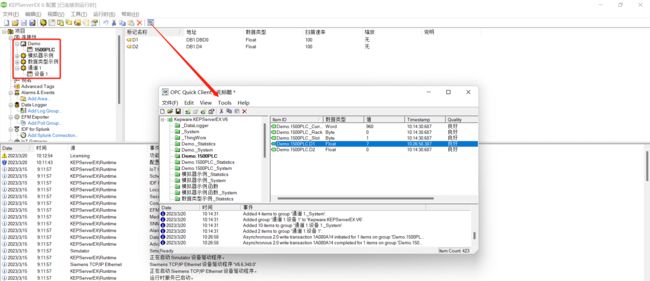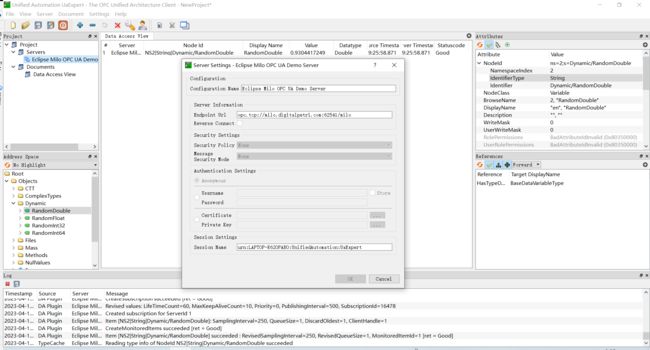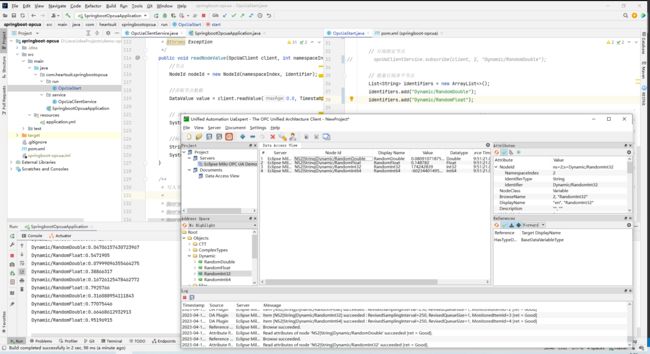SpringBoot集成Milo库实现OPC UA客户端:连接、遍历节点、读取、写入、订阅与批量订阅
背景
前面我们搭建了一个本地的 PLC 仿真环境,并通过 KEPServerEX6 读取 PLC 上的数据,最后还使用 UAExpert 作为OPC客户端完成从 KEPServerEX6 这个OPC服务器的数据读取与订阅功能。在这篇文章中,我们将通过 SpringBoot 集成 Milo 库实现一个 OPC UA 客户端,包括连接、遍历节点、读取、写入、订阅与批量订阅等功能。
Milo库
Milo 库的 GitHub 地址:https://github.com/eclipse/milo
Milo 库提供了 OPC UA 的服务端和客户端 SDK ,显然,我们这里仅用到了OPC UA Client SDK。
引入依赖
SpringBoot 后端项目中引入 Milo 库依赖(客户端 SDK )。
实现OPCUA客户端
连接
/**
* 创建OPC UA客户端
*
* @param ip
* @param port
* @param suffix
* @return
* @throws Exception
*/
public OpcUaClient connectOpcUaServer(String ip, String port, String suffix) throws Exception {
String endPointUrl = "opc.tcp://" + ip + ":" + port + suffix;
Path securityTempDir = Paths.get(System.getProperty("java.io.tmpdir"), "security");
Files.createDirectories(securityTempDir);
if (!Files.exists(securityTempDir)) {
throw new Exception("unable to create security dir: " + securityTempDir);
}
OpcUaClient opcUaClient = OpcUaClient.create(endPointUrl,
endpoints ->
endpoints.stream()
.filter(e -> e.getSecurityPolicyUri().equals(SecurityPolicy.None.getUri()))
.findFirst(),
configBuilder ->
configBuilder
.setApplicationName(LocalizedText.english("eclipse milo opc-ua client"))
.setApplicationUri("urn:eclipse:milo:examples:client")
//访问方式
.setIdentityProvider(new AnonymousProvider())
.setRequestTimeout(UInteger.valueOf(5000))
.build()
);
opcUaClient.connect().get();
Thread.sleep(2000); // 线程休眠一下再返回对象,给创建过程一个时间。
return opcUaClient;
}
遍历节点
/**
* 遍历树形节点
*
* @param client OPC UA客户端
* @param uaNode 节点
* @throws Exception
*/
public void listNode(OpcUaClient client, UaNode uaNode) throws Exception {
List<? extends UaNode> nodes;
if (uaNode == null) {
nodes = client.getAddressSpace().browseNodes(Identifiers.ObjectsFolder);
} else {
nodes = client.getAddressSpace().browseNodes(uaNode);
}
for (UaNode nd : nodes) {
//排除系统性节点,这些系统性节点名称一般都是以"_"开头
if (Objects.requireNonNull(nd.getBrowseName().getName()).contains("_")) {
continue;
}
System.out.println("Node= " + nd.getBrowseName().getName());
listNode(client, nd);
}
}
读取指定节点
/**
* 读取节点数据
*
* namespaceIndex可以通过UaExpert客户端去查询,一般来说这个值是2。
* identifier也可以通过UaExpert客户端去查询,这个值=通道名称.设备名称.标记名称
*
* @param client
* @param namespaceIndex
* @param identifier
* @throws Exception
*/
public void readNodeValue(OpcUaClient client, int namespaceIndex, String identifier) throws Exception {
//节点
NodeId nodeId = new NodeId(namespaceIndex, identifier);
//读取节点数据
DataValue value = client.readValue(0.0, TimestampsToReturn.Neither, nodeId).get();
// 状态
System.out.println("Status: " + value.getStatusCode());
//标识符
String id = String.valueOf(nodeId.getIdentifier());
System.out.println(id + ": " + value.getValue().getValue());
}
写入指定节点
/**
* 写入节点数据
*
* @param client
* @param namespaceIndex
* @param identifier
* @param value
* @throws Exception
*/
public void writeNodeValue(OpcUaClient client, int namespaceIndex, String identifier, Float value) throws Exception {
//节点
NodeId nodeId = new NodeId(namespaceIndex, identifier);
//创建数据对象,此处的数据对象一定要定义类型,不然会出现类型错误,导致无法写入
DataValue newValue = new DataValue(new Variant(value), null, null);
//写入节点数据
StatusCode statusCode = client.writeValue(nodeId, newValue).join();
System.out.println("结果:" + statusCode.isGood());
}
订阅指定节点
/**
* 订阅(单个)
*
* @param client
* @param namespaceIndex
* @param identifier
* @throws Exception
*/
private static final AtomicInteger atomic = new AtomicInteger();
public void subscribe(OpcUaClient client, int namespaceIndex, String identifier) throws Exception {
//创建发布间隔1000ms的订阅对象
client
.getSubscriptionManager()
.createSubscription(1000.0)
.thenAccept(t -> {
//节点
NodeId nodeId = new NodeId(namespaceIndex, identifier);
ReadValueId readValueId = new ReadValueId(nodeId, AttributeId.Value.uid(), null, null);
//创建监控的参数
MonitoringParameters parameters = new MonitoringParameters(UInteger.valueOf(atomic.getAndIncrement()), 1000.0, null, UInteger.valueOf(10), true);
//创建监控项请求
//该请求最后用于创建订阅。
MonitoredItemCreateRequest request = new MonitoredItemCreateRequest(readValueId, MonitoringMode.Reporting, parameters);
List<MonitoredItemCreateRequest> requests = new ArrayList<>();
requests.add(request);
//创建监控项,并且注册变量值改变时候的回调函数。
t.createMonitoredItems(
TimestampsToReturn.Both,
requests,
(item, id) -> item.setValueConsumer((it, val) -> {
System.out.println("nodeid :" + it.getReadValueId().getNodeId());
System.out.println("value :" + val.getValue().getValue());
})
);
}).get();
//持续订阅
Thread.sleep(Long.MAX_VALUE);
}
批量订阅指定节点
/**
* 批量订阅
*
* @param client
* @throws Exception
*/
public void subscribeBatch(OpcUaClient client) throws Exception {
final CountDownLatch eventLatch = new CountDownLatch(1);
//处理订阅业务
handlerMultipleNode(client);
//持续监听
eventLatch.await();
}
/**
* 处理订阅业务
*
* @param client OPC UA客户端
*/
private void handlerMultipleNode(OpcUaClient client) {
try {
//创建订阅
ManagedSubscription subscription = ManagedSubscription.create(client);
List<NodeId> nodeIdList = new ArrayList<>();
for (String id : batchIdentifiers) {
nodeIdList.add(new NodeId(batchNamespaceIndex, id));
}
//监听
List<ManagedDataItem> dataItemList = subscription.createDataItems(nodeIdList);
for (ManagedDataItem managedDataItem : dataItemList) {
managedDataItem.addDataValueListener((t) -> {
System.out.println(managedDataItem.getNodeId().getIdentifier().toString() + ":" + t.getValue().getValue().toString());
});
}
} catch (Exception e) {
e.printStackTrace();
}
}
关于断线重连的批量订阅,可以参考文末源码,我没有进行实际测试。
测试
连接KEPServerEX6的OPC UA服务器
将上一篇文章中的 KEPServerEX6 作为 OPC UA 服务器来测试我们实现的客户端功能。这里 namespaceIndex 和 identifier 参考 KEPServerEX6 的配置或者 UAExpert 的右上角 Attribute 显示。
public class OpcUaStart {
public void start() throws Exception {
OpcUaClientService opcUaClientService = new OpcUaClientService();
// 与OPC UA服务端建立连接,并返回客户端实例
OpcUaClient client = opcUaClientService.connectOpcUaServer("127.0.0.1", "49320", "");
// 遍历所有节点
opcUaClientService.listNode(client, null);
// 读取指定节点的值
// opcUaClientService.readNodeValue(client, 2, "Demo.1500PLC.D1");
// opcUaClientService.readNodeValue(client, 2, "Demo.1500PLC.D2");
// 向指定节点写入数据
opcUaClientService.writeNodeValue(client, 2, "Demo.1500PLC.D1", 6f);
// 订阅指定节点
// opcUaClientService.subscribe(client, 2, "Demo.1500PLC.D1");
// 批量订阅多个节点
List<String> identifiers = new ArrayList<>();
identifiers.add("Demo.1500PLC.D1");
identifiers.add("Demo.1500PLC.D2");
opcUaClientService.setBatchNamespaceIndex(2);
opcUaClientService.setBatchIdentifiers(identifiers);
// opcUaClientService.subscribeBatch(client);
opcUaClientService.subscribeBatchWithReconnect(client);
}
}
记得在启动类中开启 OPC UA 的客户端。
@SpringBootApplication
public class SpringbootOpcuaApplication {
public static void main(String[] args) throws Exception {
SpringApplication.run(SpringbootOpcuaApplication.class, args);
OpcUaStart opcUa = new OpcUaStart();
opcUa.start();
}
}
连接Milo提供的测试性OPC UA服务器
Milo 官方提供了一个开放的 OPC UA 服务器: opc.tcp://milo.digitalpetri.com:62541/milo ,可以先使用 UAExpert 测试连接(我用的是匿名连接),查看其中的节点及地址信息。
public class OpcUaStart {
public void start() throws Exception {
OpcUaClientService opcUaClientService = new OpcUaClientService();
// 与OPC UA服务端建立连接,并返回客户端实例
OpcUaClient client = opcUaClientService.connectOpcUaServer("milo.digitalpetri.com", "62541", "/milo");
// 遍历所有节点
// opcUaClientService.listNode(client, null);
// 读取指定节点的值
opcUaClientService.readNodeValue(client, 2, "Dynamic/RandomInt32");
opcUaClientService.readNodeValue(client, 2, "Dynamic/RandomInt64");
// 向指定节点写入数据
// opcUaClientService.writeNodeValue(client, 2, "Demo.1500PLC.D1", 6f);
// 订阅指定节点
// opcUaClientService.subscribe(client, 2, "Dynamic/RandomDouble");
// 批量订阅多个节点
List<String> identifiers = new ArrayList<>();
identifiers.add("Dynamic/RandomDouble");
identifiers.add("Dynamic/RandomFloat");
opcUaClientService.setBatchNamespaceIndex(2);
opcUaClientService.setBatchIdentifiers(identifiers);
// opcUaClientService.subscribeBatch(client);
opcUaClientService.subscribeBatchWithReconnect(client);
}
}
可能遇到的问题
UaException: status=Bad_SessionClosed, message=The session was closed by the client.
原因分析: opcUaClient.connect().get(); 是一个异步的过程,可能在读写的时候,连接还没有创建好。
解决方法: Thread.sleep(2000); // 线程休眠一下再返回对象,给创建过程一个时间。
Reference
https://blog.csdn.net/u013457145/article/details/121283612
Source Code
https://github.com/heartsuit/demo-spring-boot/tree/master/springboot-opcua
If you have any questions or any bugs are found, please feel free to contact me.
Your comments and suggestions are welcome!


